Is there an ideal solution?
Selecting the right filter is key when brewing coffee using a funnel, chemex, kalita, aeropress or drip machine.
Unfortunately, when purchasing coffee filters, caffeine enthusiasts face a dilemma: traditional options are not one-size-fits-all and each have their strengths and weaknesses. For example, paper filters trap even the most minute granules of grinds better than its metal counterpart, however it requires regular replacing. On the other hand, metal versions may last longer but make for stronger brews that will become too bitter if left undrunked after brewing due to additional particles sinking into the cup over time.
Have you ever wondered how the various coffee filters affect its taste? Here, we will explore that very topic as well as examine the convenience of using said filters. We will also take a peek at an intriguing new Japanese ceramic filter!
Types of filters and their purpose
Coffee filters come in two main categories: replaceable and integrated. From paper, cloth, metal or nylon - replacement filters are designed for one-time use but can be recycled by washing them after every brew. Disposable coffee filters offer a convenient solution that allows you to simply discard it when finished brewing.
A reusable filter is integrated within the coffee maker and should be cleaned after each use. In the event of a malfunction, however, it must also serve as an indication to dispose of the entire device.
No matter the material, every filter serves the same purpose: they block out insoluble coffee particles while allowing oils to pass through. Certain funnels even enhance oxygen saturation due to their particular shape. However, some filters work much better than others in fulfilling this task.
Replacement filters
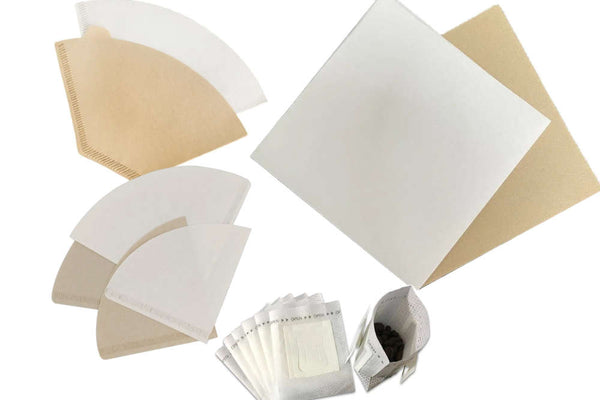
Replacement filters are often chosen for making coffee at home and in coffee shops. Some of them can be washed after use, while others should be replaced with new ones.
Hario V60 and Bonavita funnels, Aeropress, Kalit, Chemex, drip coffee makers and other coffee-centered machines all require disposable paper filters in order to properly brew a cup of delicious coffee.
Paper filters are especially efficient at isolating the oils and coffee particles, resulting in a cup of coffee with an exquisite flavor profile - light body and crisp palate.
On the one hand, paper filters are convenient - no cleaning is needed and they can simply be discarded after brewing. However, this comes at a cost as you must purchase more on a regular basis. This can become costly or even impossible if you find yourself without any filters when it's time to make coffee!
While the environmental impact of paper filters is still open to debate, there are a few points worth considering. In manufacturing bleached filters, chlorine is used which can have adverse effects on the environment through emissions. Additionally, as most paper filters are made from wood pulp that may not necessarily come from recycled material sources, their production contributes slightly to deforestation.
Baristas of every stripe can take advantage of the versatility offered by paper filters, which come in an array of shapes and sizes to meet any culinary need.
Reusable nylon filters are included with many drip coffee makers.
With its larger pores, a filter of this sort allows more small coffee particles to seep into your mug. As such, producers advise that you use coarsely ground coffee when utilizing it in order for the extraction process to differ and create a less potent beverage.
Despite their ease of use, nylon filters must be washed after each use. After 60 uses it is advised to discard and replace the filter, unfortunately, this causes a detrimental effect on our environment as plastics can take hundreds or even thousands of years to decompose fully.
Reusable metal filters are used for funnel, Chemex and Aeropress.
Metal filters permit the finer coffee particles and oils to pass through, providing a more robust flavor in your cup. However, since extraction continues after brewing it is vital to drink quickly as freshly-brewed coffee can become overly bitter if not consumed right away.
After use, the metal filter must be thoroughly washed. You can choose to do this by hand or in a dishwasher, either way is safe as the metal will not absorb water and oils, making it effortless to clean. With proper maintenance, your device should last for years unless otherwise stated!
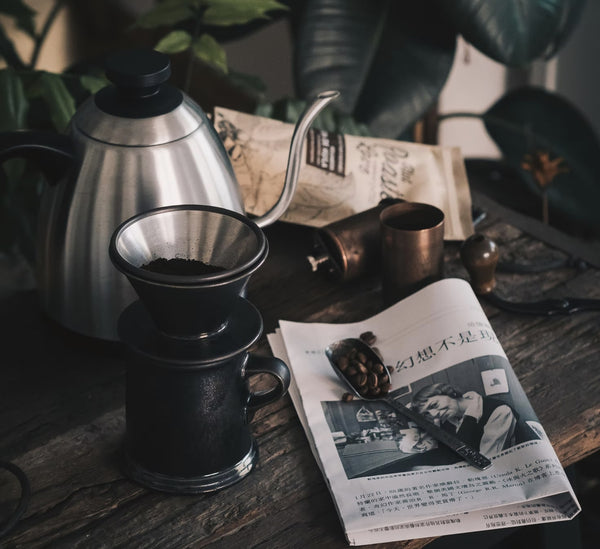
Metal filters often come with brewing devices. © unsplash.com
Reusable fabric filters are used to make coffee in a funnel, Chemex and drip coffee maker.
Crafted from hemp, cotton or muslin, filters are a coffee connoisseur's dream come true. Unlike paper variants that can ruin your brew's taste, their enlarged pores enable the finest of coffee dust to pass through - giving you that exquisite sediment in every cup. Plus, it allows for slow extraction so as to avoid over-extraction and an eventual bitter aftertaste!
Fabric filters are an eco-friendly choice when it comes to coffee brewing, since they don't need to be discarded after each use. Unfortunately, thorough washing is necessary with every brew - and detergents should not be used as they can negatively alter the flavor of your coffee. Furthermore, if you're on the go or travelling then there's no easy way for you to clean them off quickly without access to a sink.
When operating, fabric filters tend to absorb coffee dust and impart an off-taste in the drink. As such, they must be replaced every 3-4 months for optimum flavor results.
Although there are various filters, none of them offer a one-size-fits all solution. Every single filter has its own specific features - some can alter the flavor of your coffee while others might be difficult to utilize.
Built-in filters
The Hario Cafeor funnel is a top-rated device with an integrated filter, eliminating the need for extra filters.
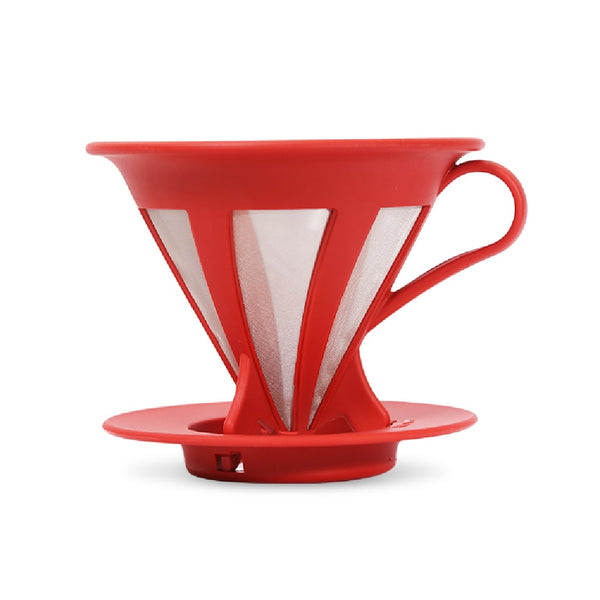
Funnel Hario "Cafeor".
The device comes in two delightful formats: an open funnel and a pour-over set. To prepare your coffee, simply place the funnel directly on top of your mug or use the special container included with the pour-over set. If desired, you can also place it on any mug with a suitable diameter! Brewing coffee in this filter is just as easy as using a traditional one—it's that simple to make delicious coffee every time!
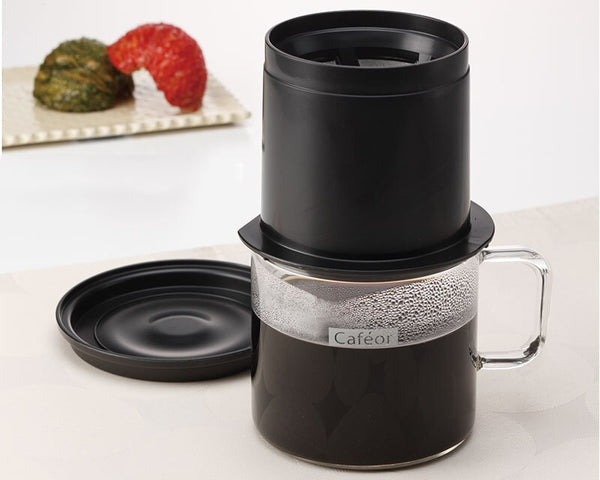
"Cafeor" for one cup. © global.hario.com
With its stainless steel strainer, the Hario Cafeor funnel is designed to efficiently hold onto those small coffee particles and pass through all of the essential oils. The result? A distinctive blend that undoubtedly packs a punch in both taste and aroma compared to any regular one!
Lightweight and resilient, Cafeor funnel is an excellent companion for your adventures. It does not require extra effort to clean as it can simply be washed with water or in a dishwasher machine. Make sure you add the smart Funnel Cafeor to your luggage before hitting the road!
Although not a one-size fits all solution, coffeemakers with integrated filters eventually start to make coffee taste off due to build up of residue. That's why people are constantly innovating and constructing new ways to brew the perfect cup every time!
Ceramic filter that will last for many years
All replaceable and built-in filters are made of paper, metal and plastic. However, other filter materials also exist.
For decades, Kyuemon, a small cookware brand owned by Japan's Kubota Minoru Ceramics Ltd., has been crafting reusable pour over filters from an exclusive porous ceramic material that resembles charcoal.
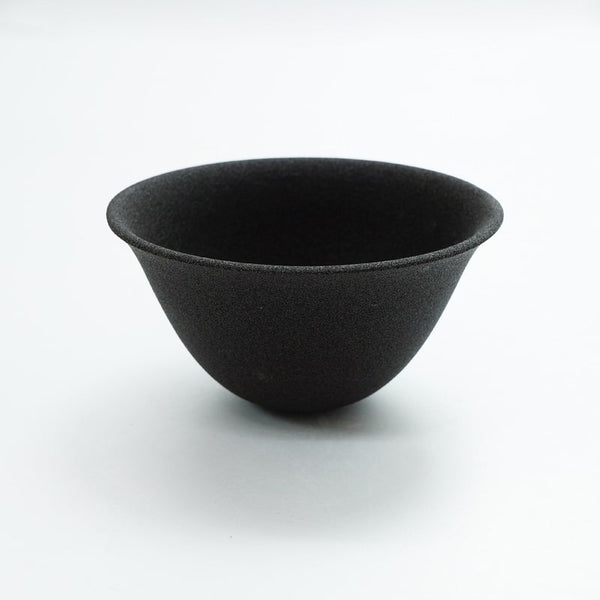
This is what a Japanese Kyuemon ceramic filter looks like. © kyuemongama.com
The filter is offered in two distinct styles: a round one, which enables you to make one cup of coffee at a time, and the V-shaped version that assists with up to three cups. You can simply place it on your favorite mug or other container without any extra brewing tools like funnels - though if this isn't as convenient for you, use the ceramic dripper included with every filter. With its bottom-hole design, the finished beverage smoothly flows into your preferred vessel!
The flavor and aroma of coffee are incredibly distinct based on how long it's filtered. Kyuemon crafted their filter with miniscule pore holes and distributed them uniformly over the area, so that even particles as small as 50 microns can be trapped inside. With such a meticulous design, you'll taste more sweetness than bitterness or acidity in your brew, no dry aftertaste will linger!
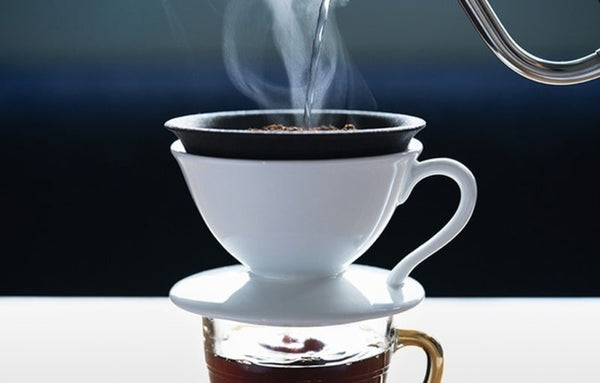
Ceramic filter in a dripper funnel. © kyuemongama.com
To adjust the potency of your favorite coffee-based beverage, choose a medium or medium-coarse grind and use it in combination with an effective filter. Manufacturers agree that this is the most optimal way to achieve maximum strength and flavor!
Crafted manually, the ceramic filter is incredibly sturdy and can withstand constant use without needing to be changed. All you need to do after brewing coffee or tea is rinse it with hot water and if there are any clogs, simply burn them off over a gas stove, BBQ grill or in an oven! This remarkable filter provides not only convenience but also versatility as it can make both coffee and either green or black teas.
Summary
A filter is essential for crafting the perfect cup of coffee, as it has a direct impact on the quality and flavor. Unfortunately, standard filters don't always deliver - some can distort taste while others are difficult to use. As such, we are constantly in pursuit of an all-inclusive device that conquers these issues!
What filter do you like to use?

